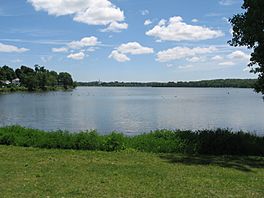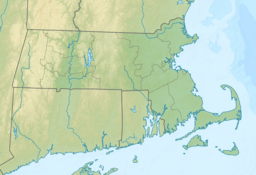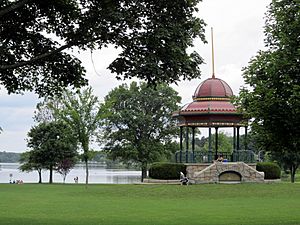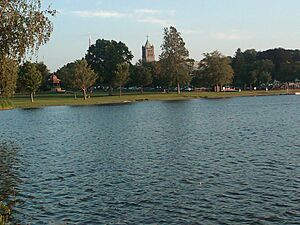Lake Quannapowitt facts for kids
Quick facts for kids Lake Quannapowitt |
|
|---|---|
 |
|
| Location | Middlesex County, Massachusetts, U.S. |
| Coordinates | 42°30′54″N 71°04′43″W / 42.51500°N 71.07861°W |
| Type | Reservoir |
| Primary outflows | Saugus River |
| Basin countries | United States |
| Surface elevation | 79 ft (24 m) |
| Dam | Lake Quannapowitt Dam |
| Settlements | Wakefield |
Lake Quannapowitt is a large lake located in Wakefield, Massachusetts. It's one of two main lakes in the town, the other being Crystal Lake. Lake Quannapowitt is a popular spot for many outdoor activities. People enjoy walking, jogging, biking, and rollerblading around its shores.
The lake is also a common place for running events. These include short 5K races and even very long Ultra Marathons.
Contents
About Lake Quannapowitt
Lake Quannapowitt was once known as Reading Pond. Its name, "Quannapowitt," is pronounced KWAN-ah-POW-it. The lake is a type of Reservoir, which means it's a place where water is stored. The Saugus River flows out of the lake.
Caring for the Lake
Since 1992, a group called Friends of Lake Quannapowitt has worked to protect the lake. Their main goal is to raise awareness and help keep the lake and its surrounding areas healthy for a long time.
In the past, some issues with the lake's health have come up. For example, tar was found in the lake years ago. Also, arsenic was put into the lake in the early 1960s to control water weeds. Because of this, the two beaches that used to be open for swimming are now closed. The Massachusetts Department of Environmental Protection has worked to clean up past contamination.
Landmarks Around the Lake
The town common of Wakefield is right on the south shore of Lake Quannapowitt. One of the most famous sights in Wakefield is the iconic bandstand. This beautiful wood and granite structure was built in 1885. It stands on the Lower Common and offers a lovely view of the lake in the background.
Wildlife in the Lake
Lake Quannapowitt is home to many kinds of fish. It has active populations of "warmwater species" of fish. This means fish that prefer warmer water temperatures live and thrive there.
Images for kids
 | Anna J. Cooper |
 | Mary McLeod Bethune |
 | Lillie Mae Bradford |






